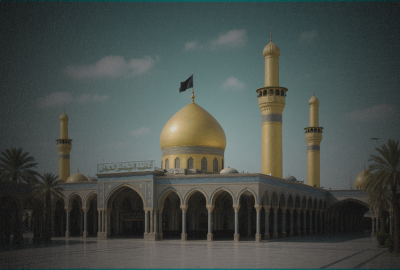Echoes of Karbala: Narrations of Muharram
Black banners drape the walls of mosques, Hussainiyas, and homes. The alam of Hazrat Abbas (as) is raised high as a symbol of loyalty and unwavering faith. Poetry, latmiyas, and nohas are recited, sharing words of grief. People attend the majalis wearing black clothes to mourn and pay their respects.
All of this for the love of Hussain ibn Ali (as), the grandson of the Prophet (saww). This love has lit a fire in us that rekindles every Muharram.
Prophet Muhammad (saww) is reported to have said, “Surely, there exists in the hearts of the believers, regarding the martyrdom of Hussain (as), a heat that never subsides.”
(Mustadrak al Wasail, v. 10)
Many narrations help us understand the magnitude of this tragedy. A few of these hadith are below.
Followers of the Ahlulbayt (as)
As followers and lovers of the Ahlulbayt (as), we must show our love to the infallibles by being happy in their happiness and sad in their sadness.
In the Quran, Allah (swt) says in Surah ash-Shura, “(O Muḥammad), say (to your followers), “I do not ask of you any reward for it (i.e., the task of conveying Allah’s message to you) except love for my near relatives.” And whoever performs the good deed (by loving The Prophet’s family), We shall increase for him in its goodness. Surely Allah is Forgiving and Thankful (to those who love the Prophet’s family). (42:23)
Imam Ali (as) is also reported to have said, “Surely, Allah (swt) has chosen for us (the Ahlulbayt [as]) followers (Shias), who assist us and are happy at our happiness and are sad in our sadness.” (Ghurar al-Hikam, v.1)
We know the Tragedy of Karbala caused immense grief and hardship for the Holy Household (as), thus we must ensure it is a period of mourning for us as well.
The Remembrance of Imam Hussain (as)
Throughout the year, we remember Imam Hussain (as). On Thursday nights, we recite Ziyarat Waritha. On a’maal nights like Laylatul Qadr, we also recite a Ziyarat of Imam Hussain (as).
Why do we remember him so often? It’s because of the sacrifices he made to save Islam. Through him, we can attain proximity to Allah (swt).
The Prophet (saww) is reported to have said, “By He (swt) who sent me as a prophet with truth that the remembrance of Hussain (as), the son of Ali (as), is greater in heaven than on the earth. On the right of Allah’s (swt) throne, he [Hussain (as)] is written as ‘the lamp of guidance and the ship of salvation’.” (Bihar al-Anwar, v.36)
If our remembrance is sincere, it will enable us to draw closer to Allah (swt) and the Prophet (saww).
This can be seen in a tradition attributed to the Prophet (saww) where he says, “Hussain (as) is from me and I am from Hussain (as). Allah (swt) loves whosoever loves Hussain (as).” (Kitab al-Irshad, p.249)
His martyrdom has not only kept him alive but also helped our souls to remain alive too.
In the Quran, Allah (swt) says in Surah al-Baqarah, “Do not speak of those who are slain in the way of Allah as dead; nay, they are alive, but you do not perceive (how they live).” (2:154)
Ashura: A Day Like No Other
The Day of Ashura is a day of immense grief, sorrow, and tragedy. This day cannot be compared to any other day.
Imam Hassan (as) is reported to have said, “O Aba Abdillah (as)! There is no day like your day, when 30,000 people who call themselves as followers of our grandfather (saww) and who call themselves Muslims will gather around you, shed your blood, dishonour you and capture your sons & women, and plunder your property.” (Al-Lohoof)
On Ashura, we must remember to put aside all worldly affairs and focus solely on the tragedies that Imam Hussain (as) and the Caravan of Honour faced. If we keep it as a day of mourning, Allah (swt) will reward us greatly on the Day of Judgment.
Imam Ali Al-Ridha (as) is reported to have said, “The one for whom the Day of Ashura is a day of tragedy, grief and weeping, Allah The Mighty, The Glorious, shall make the Day of Judgment a day of joy and happiness for him.” (Bihar al-Anwar, v.44)
Weeping for Aba Abdillah (as)
Crying for Imam Hussain (as) is highly recommended and a great form of worship that will wipe away our sins.
Imam Ali Al-Ridha (as) is reported to have said, “O’ Son of Shabib! Should you weep for Hussain (as) in the measure that tears roll down your cheeks, Allah would forgive all the sins committed by you, whether they be the great sins or the small sins and whether they be meagre or immense.” (Al-Amali of Shaykh as-Saduq, p.111)
Imam Al-Ridha (as) is also reported to have said, “Those who weep should weep over the likes of Hussain (as) for surely, weeping over him does away with one’s great sins.” (Bihar al-Anwar, v.94)
The tears shed for Aba Abdillah (as) have other benefits too, including the intercession of Prophet Muhammad (saww) and Sayyida Fatima Al-Zahra (sa).
In a narration, The Prophet (saww) said to Lady Fatima (sa), “On the Day of Judgment, you shall intercede for the ladies and I shall intercede for the men; every person who has wept over the tragedy of Hussain (as), we shall take him by the hand and lead him into Paradise.” (Bihar al-Anwar, v.94).
Why Did Imam Hussain (as) Stand Up?
A key element that can help us connect to Imam Hussain (as) and the tragedy is to understand the reason he took this stance.
Aba Abdillah (as) reportedly said, “I never revolted in vain, as a rebel, or as a tyrant, but I rose seeking reformation for the nation of my grandfather Muhammad (saww). I intend to enjoin good and forbid evil, to act according to the traditions of my grandfather (saww), and my father Ali ibn Abi Talib (as).” (Bihar al-Anwar, v.44)
This was an important stance, and he was only left with two options – either to give his allegiance to Yazid (la) and see Islam be destroyed, or to stand up against a tyrant to save Islam while sacrificing himself. The Imam (as) chose the latter.
Imam Hussain is reported to have said, “To me, death is nothing but happiness; and living under tyrants, nothing but living in a hell.” (Tuhaf al-Uqul, p.245)
Conclusion
Various narrations remind us of the reward and importance of mourning for Aba Abdillah (as). Through our grief, we honour his sacrifice, strengthen our love for the Ahlulbayt (as), and stay connected to the values of Karbala: truth, justice, and faith.
May this Muharram be a time of reflection, connection, and meaningful action. Support those in need in honour of Imam Hussain (as).
FAQ
Muharram marks the martyrdom of Imam Hussain (as), the grandson of the Prophet (saww), who gave everything to defend Islam. On Ashura, we mourn his sacrifice and the suffering of his family out of love, loyalty, and connection to the Ahlulbayt (as).
Yes. According to many hadiths, even a single tear shed for Imam Hussain (as) can lead to the forgiveness of sins. Such grief also brings the intercession of the Prophet (saww) and Lady Fatima (sa) on the Day of Judgment.
Imam Hussain (as) is the lamp of guidance and ark of salvation. Remembering him through Ziyarat and gatherings keeps his mission alive in our hearts and helps us draw closer to Allah (swt) through truth and sacrifice.
Imam Hussain (as) rose not for power or rebellion, but to reform the nation of his grandfather (saww). He stood for justice, enjoined good, forbade evil, and sought to preserve the true teachings of Islam.
Loving the Ahlulbayt (as) means sharing in both their joy and sorrow. When they grieve, especially over Karbala, we grieve with them, deepening our faith and loyalty through that emotional and spiritual bond.







